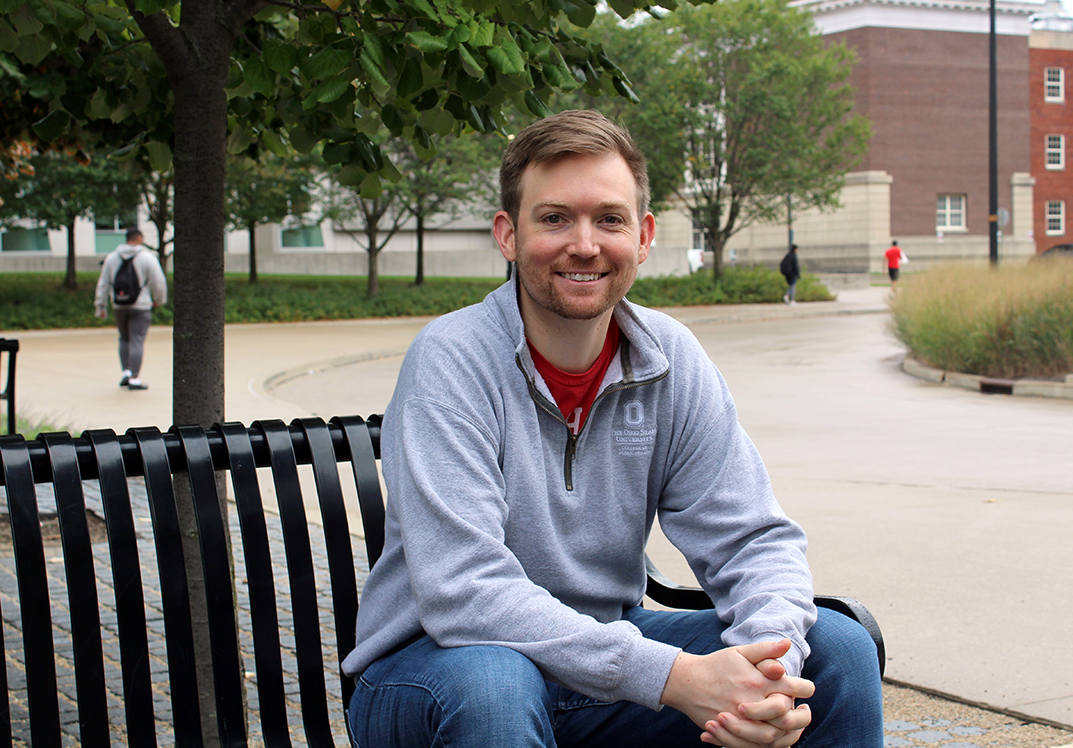Public Health Buckeyes: Trevor Moffitt
PhD student strives to improve substance use treatment outcomes

Trevor Moffitt is a fifth-year doctoral student in health behavior and health promotion. After completing bachelor’s and master’s degrees in psychology and counseling, Moffitt spent three years as a mental health counselor, where he became interested in the power of public health to improve substance use treatment outcomes and community relationships.
Question and Answer
Why did you decide to pursue a PhD in health behavior and health promotion?
I was relatively unfamiliar with the public health field before working for a local behavioral health and addiction treatment center, Maryhaven. As a research assistant on a study for the National Institute on Drug Abuse, I got to connect with individuals in recovery and see the value of interventions like medication for opioid use disorder and peer recovery support. When I told my supervisor I was applying for clinical psychology programs, she made me promise I would look at health behavior and health promotion (HBHP) programs, too. I was excited to see that HBHP uses theories that overlap with health psychology, and that my experience and expertise in substance use treatment could be applied to population health.
What are your goals after graduating?
I’d like to obtain a postdoc position that will further prepare me to conduct research on peer-support interventions, and eventually to secure a faculty position with a teaching emphasis. I’ve loved my time as a teaching assistant working with both undergrad and graduate students and have taken classes on course design and leadership to equip me for a faculty position. The challenge of making material engaging and memorable is exciting, and I enjoy creating activities that will get the classroom up and moving (and probably laughing — I usually can’t help myself).
Can you tell us about your research?
My research focuses on Ohio’s Peer Recovery Supporters, who are certified by the state to provide non-clinical support services by using their shared lived experience in mental health or substance use. During my time as a counselor, I saw the value and impact of peer supporters connecting with others who had been through similar challenges and knew I wanted to focus on peer programming in my research. We know a lot about how well these services work for those receiving them, but we have a lot to learn about what it’s like to be a peer recovery supporter. My dissertation study tries to better measure and describe the experience through a survey and in-depth interviews with supporters.
The most exciting part about my research is getting to talk to peer supporters! I’m excited that my project provides an opportunity for peer supporters to be heard, because already we’re seeing that they have a lot to share about their work and recovery experiences. I hope this project is a springboard into a long relationship with their community.
What advice would you give incoming students?
I would echo my classmates who have shared important skills when entering a graduate program — time management, goal setting, networking and student group involvement. I will add the importance of a support system with whom you can be vulnerable. You will have moments during your program that range from miserable to exceptional, and it’s important that you have someone to listen when needed. There have been times when I’ve called a buddy to share a tough situation, decompress or brainstorm solutions. Finally, just know that we all have imposter syndrome, even your professors! There may be moments when you feel like you don’t belong or deserve to be here, and addressing this negative self-talk is part of the process. Your support system can help process this with you and provide encouragement.
What do you hope for the future of public health?
My hope for the future of public health, specifically for HBHP, is more ownership and involvement for community groups and members. I’m a big proponent of community-based participatory research, which approaches public health from a collaborative, equitable standpoint: community partners are involved in every process from the start and thus have ownership of the project. I think this approach builds trust with the populations we serve and produces better interventions.
About The Ohio State University College of Public Health
The Ohio State University College of Public Health is a leader in educating students, creating new knowledge through research, and improving the livelihoods and well-being of people in Ohio and beyond. The College's divisions include biostatistics, environmental health sciences, epidemiology, health behavior and health promotion, and health services management and policy. It is ranked 22nd among all colleges and programs of public health in the nation, and first in Ohio, by U.S. News and World Report. Its specialty programs are also considered among the best in the country. The MHA program is ranked 5th and the health policy and management specialty is ranked 21st.